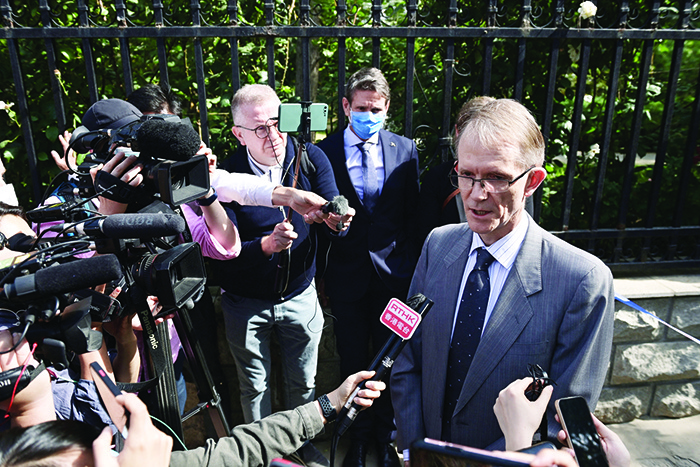 BEIJING: Australian Ambassador to China Graham Fletcher speaks to journalists outside the Beijing Second Intermediate People’s Court ahead of the trial of Australian academic Yang Jun, also known as Yang Hengjun, on espionage charges in Beijing. — AFP
BEIJING: Australian Ambassador to China Graham Fletcher speaks to journalists outside the Beijing Second Intermediate People’s Court ahead of the trial of Australian academic Yang Jun, also known as Yang Hengjun, on espionage charges in Beijing. — AFPSYDNEY: An Australian academic on trial in China for espionage has told supporters he has been tortured in detention and still does not know which country he is accused of spying for. Chinese-born Yang Jun said he was mistreated while being held at a secret detention site after being taken into custody more than two years ago. “The first six months... was a really bad period. They tortured me,” he said in a message seen by AFP. “I’ve already been held in a place worse than prison for over two years now.” The 56-year-old academic’s trial began behind closed doors on Thursday, with the Australian ambassador in Beijing denied access.
Yang said that he can only eat with two teeth due to dental problems and was “tired and confused” during Thursday’s hearing, in which he “didn’t have the spirit to speak enough.” “I only spoke for three? five minutes. My own defense was not so good.” Yang insisted he is “100 percent innocent” and said he had tried and failed to get records from his interrogation dismissed. “It’s illegal. Torture,” he said, accusing authorities of using a “hidden camera”. “The interrogations I had been subjected to, where I was told I had to confess... Perhaps someone was taking revenge against me.”
Yang also said he failed in a plea to be allowed to submit evidence and call witnesses in his own defense. Beijing has said the trial can lawfully be held in secret because it involves “state secrets” and has criticized Australia for “interference” at a time of deteriorating relations between the two nations. Yang, and who also goes under the pen name Yang Hengjun, also said he was still unclear who he was accused of spying for. “This isn’t a crime of ideology. The charges are about espionage. But who did I work for? If this is a crime, and if I’m a criminal, then who did I work for? I didn’t work for Australia or the US,” he said. “I’m only writing for people. Writing for rule of law, democracy, and freedom.” Yang reportedly once worked in China’s foreign affairs ministry in Hainan province-although this has been denied by Beijing. He is believed to have left mainland China for Hong Kong in 1992 and then travelled to the United States five years later, where he worked for the Atlantic Council think tank. He later took up Australian citizenship-although Beijing does not recognize dual nationality-and wrote a series of spy novels and a popular Chinese-language blog.
Yang went missing in China once before in 2011, describing his disappearance as a “misunderstanding” when he resurfaced days later. Beijing has outlined almost no details of the case against him since he was taken into custody. The country’s judicial system convicts most people who stand trial, and espionage charges can carry a sentence of life in prison. Relations between Canberra and Beijing have deteriorated sharply in recent years, with disputes over everything from telecoms giant Huawei to the origins of COVID-19 and human rights issues in Hong Kong and Xinjiang. China has in return imposed tariffs on Australian exports worth billions of dollars and cut off diplomatic channels between the two nations. —AFP










